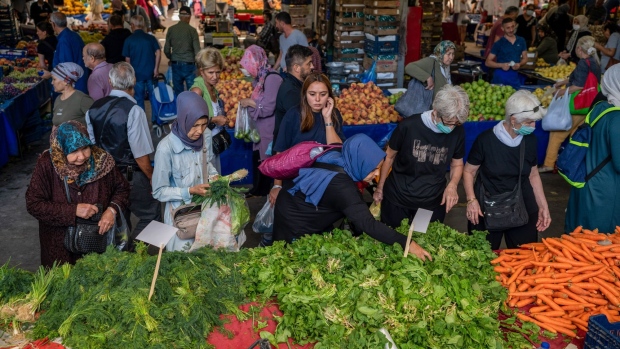Oct 3, 2022
Turkey’s Inflation Exceeds 83% as Erdogan Wants Even Lower Rates
, Bloomberg News

(Bloomberg) -- Turkish inflation accelerated last month to a level last seen in mid-1998, fueled by an experimental central bank policy that has chased away foreign investors and eroded the lira’s value.
Consumer prices rose 83.5% on an annual basis in September, according to data released on Monday by Turkey’s statistics agency, in line with the median forecast in a Bloomberg survey. Monthly inflation quickened 3.1%, slightly less than expected in a separate poll.
The acceleration follows a series of interest-rate cuts this year by central bank Governor Sahap Kavcioglu that threaten to pile even more pressure on inflation. The surprise policy turn has made Turkey an outlier among global monetary authorities, most of which are aggressively tightening to get a grip on price increases.
As a result, Turkey has the world’s deepest negative interest rates when adjusted for inflation, depriving it of a buffer to protect local assets against a selloff. The lira has lost more than 50% of its value against the dollar in the past 12 months.
What Bloomberg Economics Says...
“Turkey’s annual consumer price inflation surged higher in September and that’s not the end of it. We expect inflation to continue to rise in October, with the central bank’s ongoing easing cycle to feed further into price gains. Against a backdrop of rate hikes in developed and peer emerging economies, the impact on the currency and the feed-back into inflation may be faster and higher in the current cycle.”
--Selva Bahar Baziki, economist. Click here for more.
Turkey’s central bank said in its latest forecast in July that inflation should peak somewhere between 80% and 90% by October. The government estimates that it’ll slow to 65% at the end of this year.
But President Recep Tayyip Erdogan has insisted on even lower interest rates, saying they’ll help reduce inflation. It’s an argument that contradicts conventional economic theory -- and which, so far, hasn’t been validated by real-world experience, least of all in Turkey. He has called for the benchmark rate to be cut to below 10% by year-end, from 12% currently.
Turkish officials reject criticism that rampant price increases are a result of monetary policy errors, instead blaming Russia’s invasion of Ukraine for a global rally in commodities including energy and food. Yet even when the impact from such volatile items is excluded, annual Turkish inflation stood at 68.1% last month.
The experimental policies have already pushed inflation above 100% in parts of the country. Consumer prices in Istanbul, Turkey’s most populous city, more than doubled from a year earlier, according to a retail price index released on Saturday.
Prices Are Getting Out of Control in Turkey’s Most Populous City
A breakdown of the Istanbul data showed the cost of everything from rent to food rose sharply last month. Attempting to ease the pain for lower-income Turks ahead of elections scheduled for next June, the government has raised the national minimum wage twice in a year.
The central bank will hold its next rate-setting meeting on Oct. 20, and publish its fourth inflation report of the year a week later.
(Updates with economist comment.)
©2022 Bloomberg L.P.





